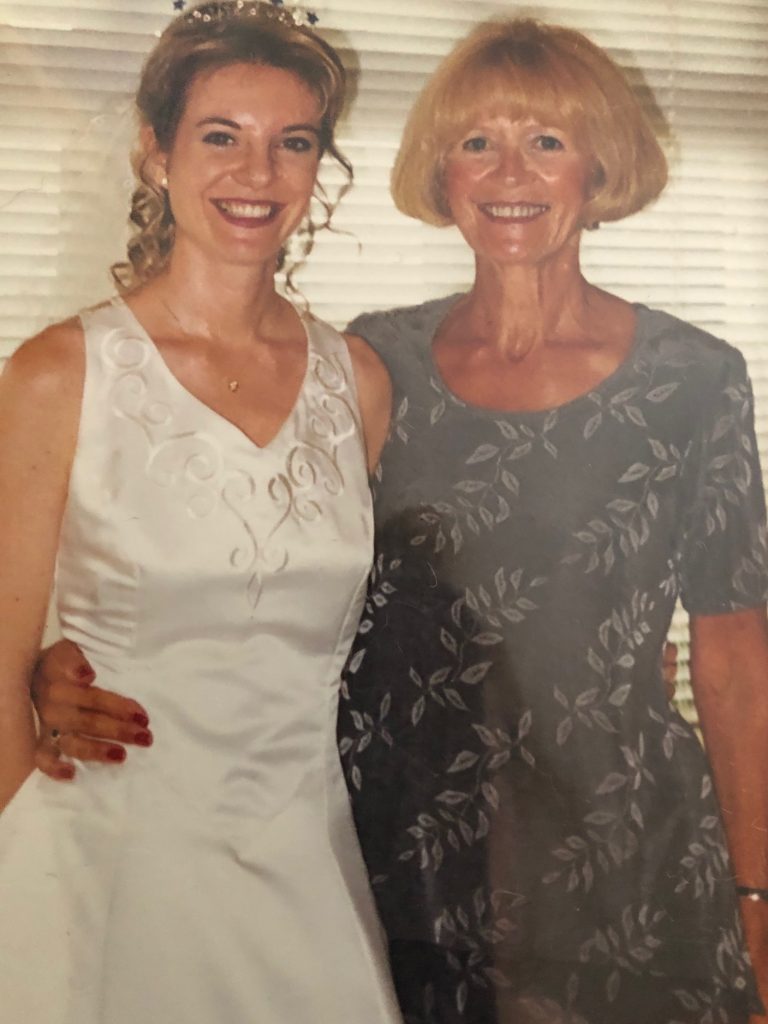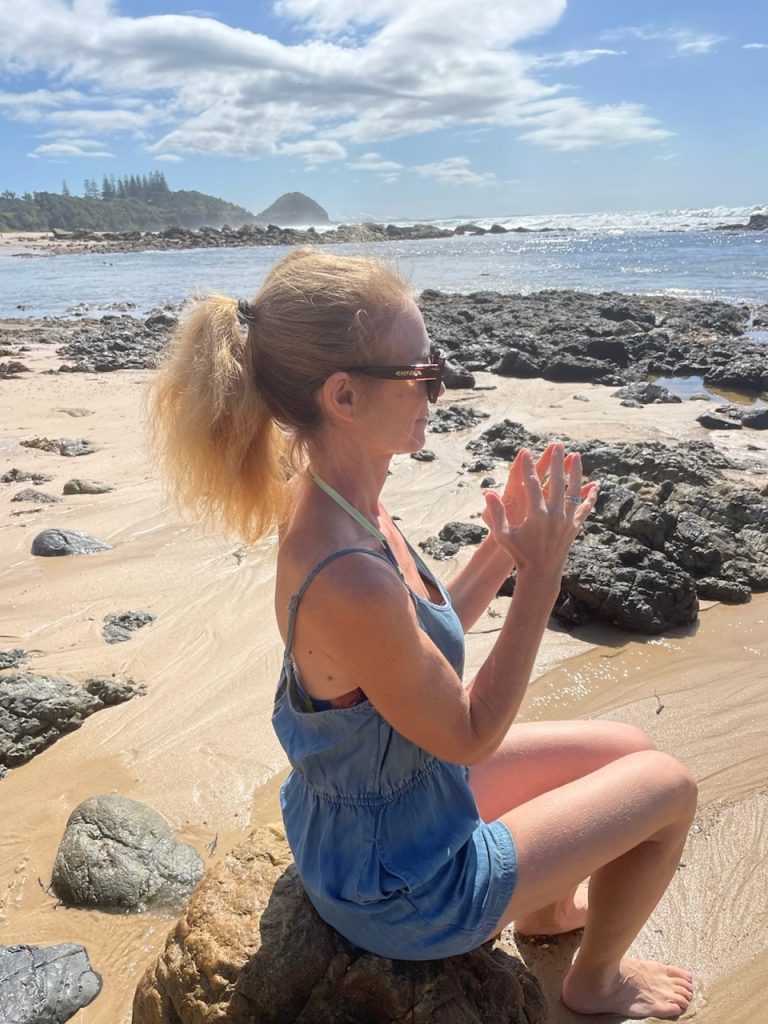Mum’s cancer was mistaken for IBS

The cancer is bowel cancer. The condition it can be mistaken for is Irritable Bowel Syndrome. I know, because my mum was diagnosed with Irritable Bowel Syndrome – which turned out to be a fatal mask for colo-rectal cancer.
Did you know that bowel cancer is the second most common cancer in Australia – a cancer that lurks deep within us in an area none of us like to discuss – and that’s precisely why it’s so dangerous.
And what’s more – it can easily be missed, there are no lumps and bumps, and it has exactly the same symptoms of a far minor condition.
But there’s a test you can do at home to screen for bowel cancer, and from the ages of 50-74 you are even sent it for free. So if this applies to you, please make sure you take the time to send it off! More information at the end of this blog.
Mum’s story:
Mum always had “tummy trouble”, it seemed to get worse when she was stressed. In fact it was a family joke. Mum used to laugh at her gurgling tummy and constant trips to the bathroom.
As the years rolled by Mum’s “tummy trouble” didn’t get any better, in fact it was pretty bad, so she went to the doctor about it. She received a knowing smile and a friendly shrug. “Stress,” the doctor said. “Nothing we can do.” So Mum filled the cupboards with vitamins and minerals and tried some deep breathing to keep her stress levels nice and low.
More years passed, Mum went through “the change,” weight dropped off her and when you hugged her you could feel the hard edge of her ribs through her elegant clothes.
“I’m fine,” she’d say dismissively, besides she was far too worried about me, her only child and her husband of 30-odd years, to be concerned about herself.
Still Mum diligently visited her doctor and was put on a course of HRT. It all seemed to help, but every time I saw Mum I couldn’t help but think how she’d aged. Lines crossed her once flawless skin, her hair had lost its gloss. And still the ‘tummy troubles’ would come and go. Eventually a doctor decided it was Irritable Bowel Syndrome.
About eight years later, I travelled overseas. We chatted regularly on the phone. Mum said she felt great. She didn’t mention anything about “tummy troubles”. And I didn’t ask.
I returned home and we went out for an Indian meal. Afterwards Mum was doubled-up and had to race to the bathroom. She dismissed the pain. “Just my old tummy troubles,” she said. I pleaded with Mum to visit another doctor and so she did.
This time she came back with a grin across her face. “It’s only the Irritable Bowel Syndrome,” she said, handing us a leaflet.
We read the symptoms: Constipation, the runs, bloated tummy, cramping. “Look,” Mum said pointing to them all. “That’s exactly what I have.” So, Mum was convinced of her diagnosis. It seemed to improve, or perhaps Mum didn’t complain. Besides, my shy, intensely private and selfless Mum certainly didn’t want to have specialists probing around her bowel, if the doctor was so convinced everything was okay.
Mum made such an effort with her appearance, that she always looked radiant, with a face and figure that belied her years. Surely nothing could be seriously wrong with her.
I applied for residency in Australia with my husband and we were accepted. The plan was for us to settle in Sydney and my parents would join us.
I’d been in Australia a year, and I was about to go to a party when the phone rang. It was Mum. Her voice sounded strange. Almost as if she was trying to sound normal. She told me to sit down and said something about bad news.
Immediately I felt sick. “I’ve got cancer,” she said. I could picture her on the other side of the world, feeling worse about telling me than about the news itself.
“Are you all right?” she asked, her voice full of concern. Then she started saying that out of all the cancers to have this was the best one. I heard other words and phrases, …slow growing… cut out the tumour… I’ll be fine… but they didn’t mean a whole lot.
From then on it was like free-falling into an abyss – instead of Mum getting better, she got worse, much, much worse.
Every visit to the specialist brought more bad news. They couldn’t operate – the tumour was too big, the temporary colostomy bag became permanent, the radiotherapy didn’t work as well as they’d hoped… It would be fatal… it was a matter of time…
I flew over to be with Mum. Instead of finding someone sorry for herself, I found a woman overflowing with optimism, instead of finding someone bitter with the medical service, I found someone who found blame with herself – and no-one else.
“I’ll be happy with three years,” Mum said brightly, holding my hand. I felt a part of me crumple when she said that, little knowing that she’d only live a matter of months.
Eventually I returned to Sydney, Mum literally shoe-horning me on to the plane. “Go,” she urged. “It’s my goal to come and visit you there.”
And so I carried on with my life on the other side of the world, simultaneously craving and dreading those nightly calls with Mum. It would be so sweet to hear her voice, but so terrible to hear her news. Each time we spoke I tried to be positive, not thinking of how long I’d be able to enjoy these comfortable chats with my mother and my best friend.
Mum was put on six-months of chemotherapy – it was on a drip 24 hours a day, seven days a week. Again, she was an inspiration, placing the small intravenous chemo pump in bags she’d co-ordinate with her clothes. Then Christmas arrived, and Mum was to come off the chemo. At first it looked good. The tumour hadn’t grown, but then again, it hadn’t shrunk. But almost overnight, the tumour began to swell – without the chemotherapy coursing through Mum’s veins like a valiant battalion keeping the toxic poison at bay, the cancer grew and overtook my mum.
I was planning to come over in February, Mum didn’t want me over when she wasn’t at her best – and she kept believing she would still win the war.
But then just after New Year, the phone rang. It was Dad.
“Get on the next flight,” he said. “Mum’s not going to make it.”
I flew around the flat putting things (I don’t even know what) into a suitcase, my hands were shaking and I couldn’t trust myself to speak. A friend booked me on a flight, it was busy I’d have to wait until the morning. No sleep, too many thoughts. The worst flight I could possibly imagine: twenty four hours of hell – not even knowing if when I finally got there Mum would be alive.
I missed the bus to take me to Bournemouth – I was wearing shorts from my summer in Sydney and it was 6am in a wintery Heathrow Airport. Cold. Dark. Unfriendly. It all seemed so normal, but my mum was about to die and I might miss her because I missed the bloody bus. I felt like opening my mouth and screaming as loud as I could.
In the end I finally got on a bus and went straight to the hospital.
I saw my mum propped up in bed. Her body ravaged by the cancer, her belly swollen, her once manicured nails cracked and rotten. But her eyes, sunken deep into her face were bright and smiling.
She lived another week.
It’s taken me years to try to write this. Every time I read something about Cancer I wish it was about the scourge of Bowel or colo-rectal cancer, but it rarely is.
Save your life with a free test
It was only as Mum was dying that I discovered she’d seen blood in the toilet and that during the last year before diagnosis, even when she was in so much pain she could barely sit, doctors were still telling her she had IBS. And Mum just wanted to believe that. All it would’ve taken to make an early diagnosis – and almost certainly save Mum’s life – was a colonoscopy or bowel test. We’re lucky in Australia – you even get a FREE bowel screening test you can do in your home. Please, if you or your loved one has any symptoms of IBS – check for Bowel Cancer for peace of mind.
Thank you XX


Katie, you are so brave to write this. Reading it makes me teary. Sending so much love to you ❤️❤️❤️